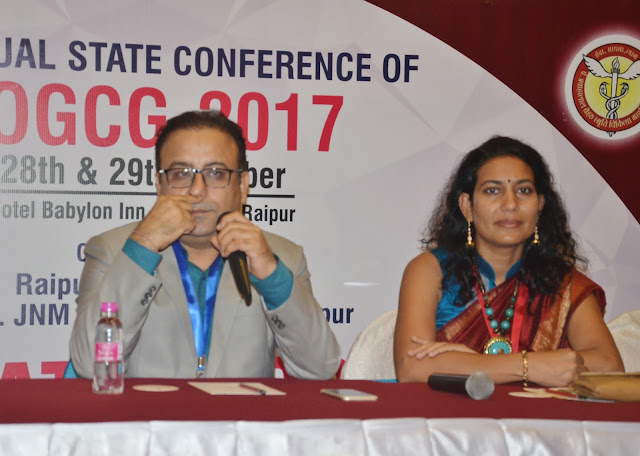13thAnnual State Conference of Raipur Obstetrics& Gynecological Society Raipur commemorate
· More than 200 doctors from all over the state participating
· Focus on how to educate doctors to sensibly handle the medical emergencies during pregnancy to curb the direct and indirect causes of maternal mortality
· Addressed the decision dilemmas such as a repeat C-section is not always necessary in second chance if the first one is C –section and vaginal birth can be offered if found appropriate.
· Update on new vaccination during pregnancy
· Live operative workshop held at Mekahara for better understanding
A large number of pregnant women are at risk during their journey towards motherhood. 13th Annual State Conference on “High-Risk Pregnancies and Critical Care in Obstetrics” elaborate on how primary to tertiary set up can manage the emergencies in pregnancy and provide critical care in Obstetrics is being organized at Raipur, Chhattisgarh on 28th and 29th October by Raipur Obstetrics and Gynecology Society & Pt. JNM Medical College under the able guidance of Dr Abha Singh (Organizing Chairperson), Dr Tripti Nagaria (Org Co-Chairperson), Dr Manoj Chellani (Org Co-Chairperson) &Dr Jyoti Jaiswal (Organizing Secretary). More than 200 gynecologists from all over the state participated in the informative session followed by live operative workshop held at Mekahara. Important guest present for the inauguration were Dr Mahesh Gupta, from Ahmedamad and Dr Manoj Patki from Mumbai.
A high-risk pregnancy is one that threatens the health or life of the mother or her fetus and often requires specialized care. Critical Care Obstetrics provides expert clinical guidance throughout on how you can maximize the chances of your patient during emergencies. The conference focused on managing the untouched factors in such a way that with limited resources even a primary care center can provide the required medical help.The session observed rigorous discussion between the panelist and the experts.
Factors that increase maternal death can be direct or indirect. Generally, there is a distinction between a direct maternal death that is the result of a complication of the pregnancy, delivery, or management of the two, and an indirect maternal death, that is a pregnancy-related death in a patient with a preexisting or newly developed health problem unrelated to pregnancy. The most common causes are postpartum bleeding (15%), the complication from unsafe abortion (15%), hypertensive disorders of pregnancy (10%), postpartum infection (Sepsis 8%) and obstructed labor (6%). Other include blood clots (3%)and pre-existing condition (28%). Indirect causes are malaria, HIV/AIDS, and cardiovascular disease, all of which may complicate pregnancy.
Dr Abha Singh, Organizing chairperson and Dean of Raipur Medical College Raipur said that “According to Health & Welfare Ministry Maternal Mortality Ratio (MMR) has shown a decline from 212 per 100,000 live births in the period 2007-09 to 178 per 100,000 live births in the period 2010- 12, but it’s still an alarming situation as far as rate of maternal deaths is concerned.”
Dr Tripti Nagaria, Head of Dept pointed out that “According to the World Health Organization, every eight minutes a woman dies from complications arising from unsafe abortions. Complications include hemorrhage, infection, sepsis and genital trauma. Additionally, lack of access to skilled medical care during childbirth, the travel distance to the nearest clinic to receive proper care, number of prior births, barriers to accessing prenatal medical care and poor infrastructure enhances these conditions.”
Addressing the program, Dr.Manoj Chellani the co-organizing chairperson and President Raipur Obs Gyn society said that “To tackle the known causes of the maternal mortality such type of interaction among doctors help to exchange views and in turn helps in improvement of treatment of the patient. This is the 13th year, the State level conference is being organized in the state where doctors from different places have dropped in to avail the benefit.”
Dr Jyoti Jaiswal, the organizing secretary informed that “The live operative workshop held at Mekahara was highly appreciated by the doctors who were able to observe the live demonstration of their theoretical session. We have always tried to cater to those areas updating of which can in turn benefit patients. The session observed rigorous discussion between the panelist and the situation. We will keep on focusing such issues.”







I like this blog so informative. Best cosmetic gynecology clinic in Mumbai"
ReplyDelete